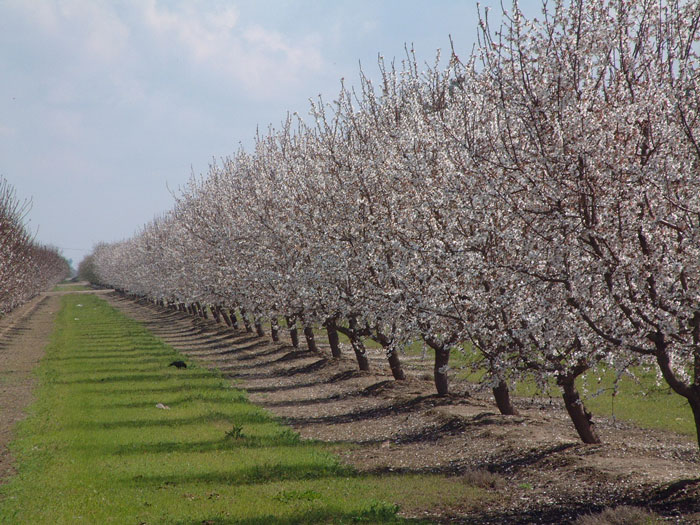
Research areas include looking for solutions to a threat posed by the Varroa mite and other pests, disease management and honey bee forage, lack of honey bee genetic diversity, the impact of pesticides and technical assistance for beekeepers. Researchers also continue to look at what are termed “self-compatible almonds,” which have reduced reliance on bees.
July 15, 2015

The Almond Board of California recently announced ambitious research projects that will cost $2.5 million and are expected to make further headway in the efforts of California producers to arrive at more efficient farming practices to reduce the amount of water applied to the crop.
“Growers use 33 percent less water to grow a pound of almonds than they did two decades ago,” said Almond Board CEO Richard Waycott while announcing the new research efforts.
Despite those improvements in water savings, producers have been criticized by some because of the amount of water it takes to grow the crop.
Waycott said the announced research “will fuel the next round of innovation to ensure we continue to grow healthy, nutritious food while improving water efficiency and continuing to protect our pollination partners.”
Honey bees are vital to the pollination of almonds and other crops, and nine honey bee health projects are planned.
Since 1995, the almond board has invested more than any other commodity group on research related to honey bee health.
Research areas include looking for solutions to a threat posed by the Varroa mite and other pests, disease management and honey bee forage, lack of honey bee genetic diversity, the impact of pesticides and technical assistance for beekeepers. Researchers also continue to look at what are termed “self-compatible almonds,” which have reduced reliance on bees.
The projects will be done by third-party researchers, most of them with the University of California or the U.S. Department of Agriculture, although some will be at a variety of universities across the country.
Research costs are funded by a handler assessment of 3 cents for every pound of almonds produced.
In all, 56 projects were approved for funding.
In addition to the pollinator projects, they include:
A total of 13 water projects. Since 1982, the board has funded 91 irrigation research projects. The research is expected to build on savings already achieved, mainly through a shift by many growers from flood irrigation to drip and micro-sprinklers.
Continued support for the California Almond Sustainability Program. This self-assessment and education program documents almond growers’ and handlers’ achievements in adopting cost-effective, environmentally and socially responsible practices and highlights where opportunities for improvement exist.
Topics covered by the program include irrigation management, nutrient management, air quality, water quality, energy efficiency, the ecosystem, financial management and pest management.
The program now develops and deploys support tools designed by peer growers and handlers and university experts. Since its inception in 2009, there have been more than 1,380 participants in the program, who have assessed their current practices on more than 375,000 acres.
Research into other issues like air quality, pest and disease management.
The projects were selected from more than 70 proposals by a research advisory committee of independent experts who assess the proposals for scientific merit, along with two committees of almond growers and processors.
The announced projects, all of which are to be completed in the coming fiscal year, drew praise from Bill Lyons, former California secretary of agriculture. A grower of almonds on Mape’s Ranch in Modesto, Lyons said he is “very proud of the ongoing financial commitment by the Almond board of California to independent, third-party research into the next generation of innovative production practices.”
Kelly Covello, president of the Almond Hullers and Processors Association, also issued a statement applauding the Almond Board’s continuing financial support for research. She said the funding will help farmers “continue developing cost-effective, environmentally and socially responsible growing practices.”
Established in 1950 and based in Modesto, the Almond Board of California is a non-profit organization that administers a grower-enacted Federal Marketing Order under the supervision of the United States Department of Agriculture.
Since 1973, the board’s production research committee has spent $20.3 million on 271 projects. Since 1995, nutrition research has totaled $18.3 million on 80 projects, and since 2003 the environmental committee at the board has spent $4.7 million on 37 projects.
Almond quality and food safety research expenditures on 79 projects since 2001 have totaled $5.9 million.
About the Author(s)
You May Also Like



